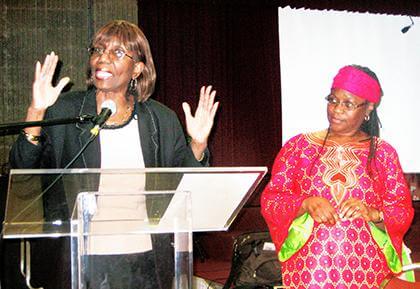By Ivan Pereira
For years York College has had to deal with a major flooding problem under its academic core building.
Because of the rising water table under southeast Queens, the subbasement of the CUNY school’s main building has had water rise to as high as 2 feet and get in contact with electrical wires.
But help is on the way, according to engineers, who showed their plans for a multi-pronged solution at Community Board 12’s monthly meeting last week.
York College Dean Ronald Thomas said the school has been hoping to fix the flooding problem quickly because it presents a risk of seriously crippling the school even shutting it down.
“We’ve got to get [the water] out of the basement and keep the college open,” he told the board during its monthly meeting May 19.
The subbasement, which houses the school’s electrical and boiler systems, is 31 feet below sea level and during heavy rains is prone to having excess water rise, according to Alireza Vedavarz, director of engineering at CUNY. The problem has gotten worse over the years because the city has stopped pumping water from nearby wells, causing the high water table under York to rise, Vedavarz said.
The college hired the engineering consulting group Tectonic to analyze the situation and come up with a plan to stop the flooding. Engineer Thomas Critelli said his group’s preliminary plan would involve a submersible deep well that would be constructed under the campus.
The well would take the water from the subbasement and transfer it to another section of the college, according to Critelli. The locations his team is looking at so far would be the ground under the performing arts center or the health and physical education building.
Critelli noted the pumping would change the water table for locations near the college, specifically near South Road where there are some residential properties. The architect said he and his team are exploring options of resolving the water table problem, including the possibility of installing pumps in some of the homes with the residents’ permission.
Other changes would include a temporary sidewalk closure on Liberty Avenue during the 10-month construction period. The project is set to be finalized by this summer and construction is slated for August 2011, according to the engineer.
Residents and board members expressed concerns about the construction and how it would affect their homes, but Vedavarz reassured them the college will do all it can not to disrupt the community.
“It’s going to be a proven system. It’s going to work and it won’t have any impact on neighbors,” he said.
Reach reporter Ivan Pereira by e-mail at ipereira@cnglocal.com or by phone at 718-260-4546.



































